Editor's note: On March 12, 2020, the World Health Organization (WHO) declared COVID-19 a pandemic, and as of Saturday ( June 6), about 200 countries and regions in the world have confirmed over 6,535,000 infection cases, according to the WHO. On CGTN's live program "COVID-19 Frontline," we invited experts from China and other parts of the world to share their experiences and take questions from social media, in the hope of providing more information for those who are battling against the pandemic.
In the latest episode of CGTN's livestream program "COVID-19 Frontline" held on Friday, June 5, CGTN in collaboration with Class CNBC, brought together health experts, economists and industry leaders from China and Italy to discuss the resumption of production and economic recovery as the global economy enters a recession due to the pandemic.
Live: Talks between China and Italy – how to restart the economy?
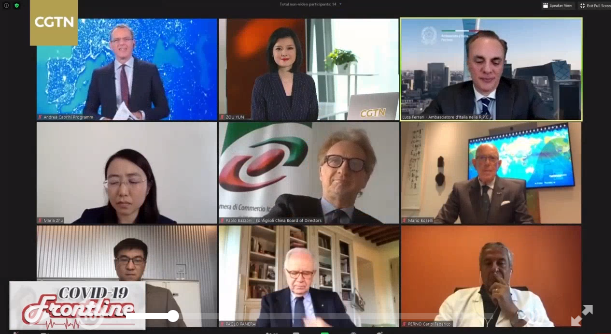
Experts from China and Italy discuss the resumption of production and economic recovery via a video conference, June 5, 2020. /CGTN
Experts from China and Italy discuss the resumption of production and economic recovery via a video conference, June 5, 2020. /CGTN
Luca Ferrari, Italian ambassador to China, also joined the webinar. "Chinese industrial sector, not only Chinese, but also foreign companies in China, have their production back to at least 98 percent. International financial institutions tell us that by the end of the year, China should be back to growth... I think this is very important for Europe as a whole and for Italy in particular...Export-oriented countries like Italy or other European countries have a lot of stake in the China's growth in the second half of the year," Ferrari said.
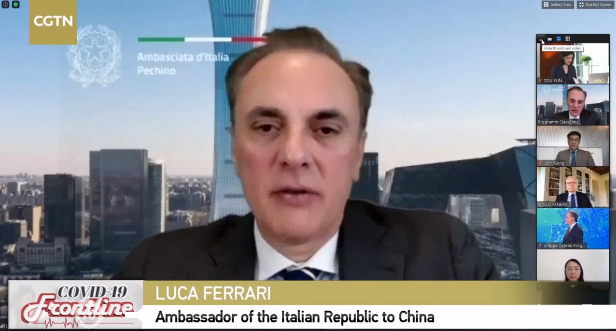
Luca Ferrari, Italy's ambassador to China. /CGTN
Luca Ferrari, Italy's ambassador to China. /CGTN
This week, Italy allowed unrestricted travel between Italy and other Schengen countries. As of the time of writing, Italy has recorded a total of 234,013 confirmed COVID-19 cases, with 33,689 deaths, according to the WHO.
Has the novel coronavirus changed?
Zhu Huachen, association professor of Division of Public Health Laboratory Science, Hong Kong University, said it's not surprising if the virus is mutating. It seems the fatality rate is decreasing a little bit recently. Only a few hundreds of asymptomatic cases emerged in the city-wide nucleic acid testing conducted in Wuhan, the former epicenter of the coronavirus outbreak in China. The massive reduction in the number of patients with symptoms indicates the pathogens in this virus is decreasing. But more scientific evidence is needed.
Carlo Federico Perno, Professor of Microbiology, University of Milan, has a different perspective. He said by treating the patients at an earlier stage, the disease was milder, but the virus was not. It might become milder in the future, but today the virus is more or less the same as it was at the beginning of the outbreak.
How to restart the economy?
John Gong, professor of University of International Business and Economics, said small and medium-sized enterprises in China provide 70 to 80 percent of the jobs. In order to help them survive during the pandemic, enough loans need to be provided, rent needs to be reduced for one or two months, and taxes should be reduced as well.
05:39

Michele Geraci, an economist in Italy, said unlike China, there aren't as many state-owned enterprises in Italy. Besides, the structure of China's economy is unique, 45 percent of China's GDP comes from investment. While in Italy, the number is only 15 to 18 percent.
05:23
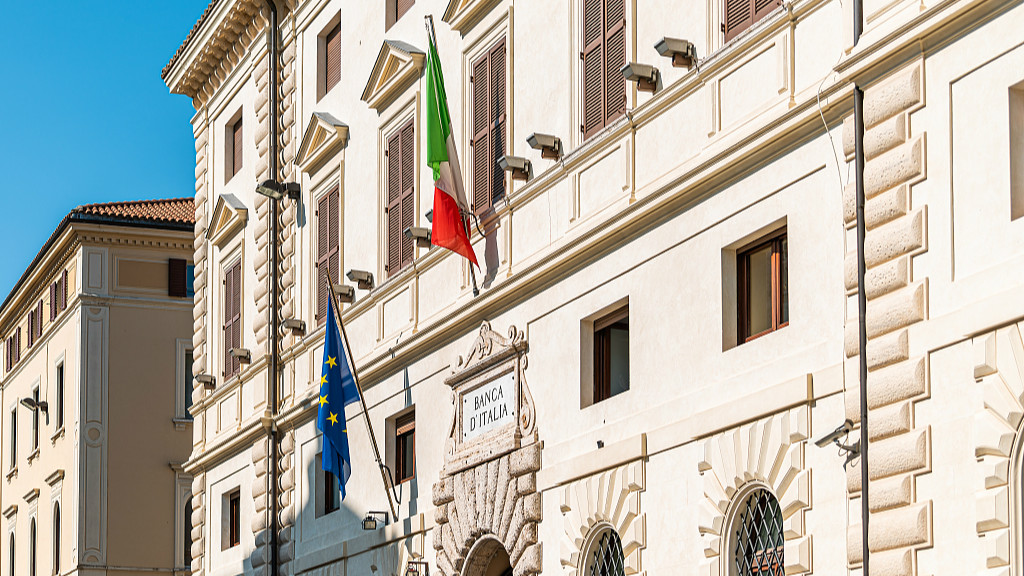
The impact of the pandemic on the Belt and Road Initiative
Italy was the first among the G7 countries to sign on to the Belt and Road Initiative (BRI). According to Michele Geraci, the infrastructure construction in Africa and the Middle East will not be affected by the epidemic, because most people work outdoors in a vast area. And Italian companies can benefit from BRI, which should be given a stronger push.
Gong said this year would be very difficult as most parts of the world will see a negative economic growth, and he doesn't think China is going to make a strategic change. The overall direction of the BRI is still very sound. There are many loans associated with the initiative. Some politicians talk about loan relief, however, these are not charitable projects but commercial projects, which can lift the overall infrastructure level and create more manufacturing jobs in these countries, according to Gong.
07:05
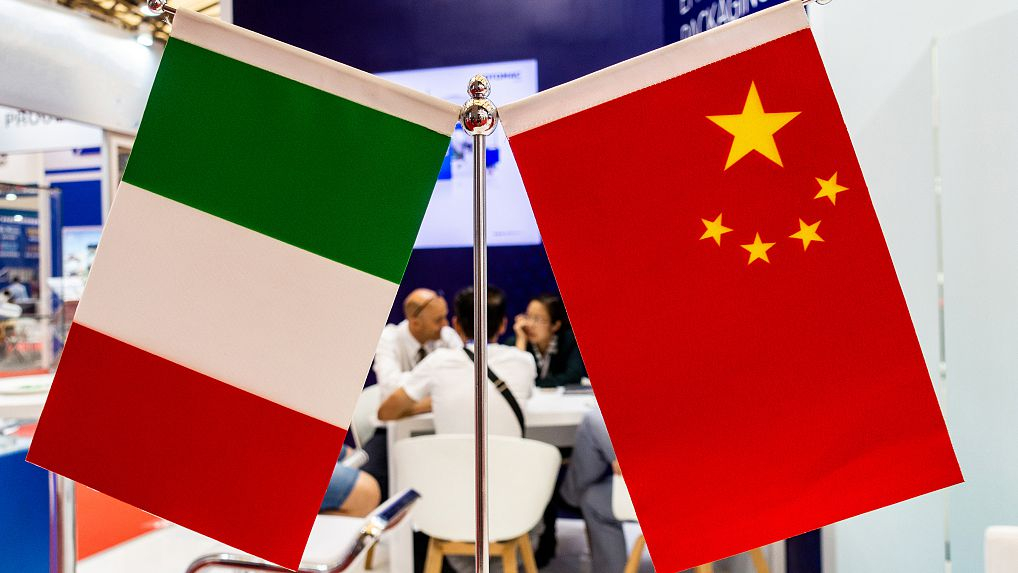
Perspectives on business switching from offline to online
Carlo Maria Ferro, president of Italian Trade Agency, said digitization is a very important. He said Italy is at the top of the high-end manufacturing industry, but it also needs more digitization. With digital tools, everything can go back to normal. Digital management business has been reestablished and training programs for digital managers have been launched.
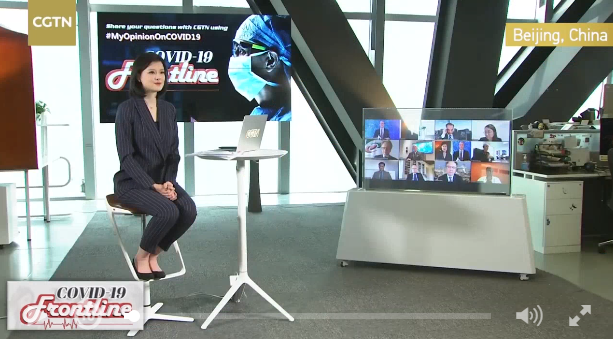
CGTN's live stream program "COVID-19 Frontline" held on Friday. /CGTN
CGTN's live stream program "COVID-19 Frontline" held on Friday. /CGTN
In later episodes of "COVID-19 Frontline," more frontline doctors and experts from Wuhan will join in to share their experience with their colleagues from other parts of the world. If you have any questions regarding COVID-19, you can share them with us using #MyOpinionOnCOVID19 on Facebook.
Videos by Zhang Rongyi
Cover image by Du Chenxin